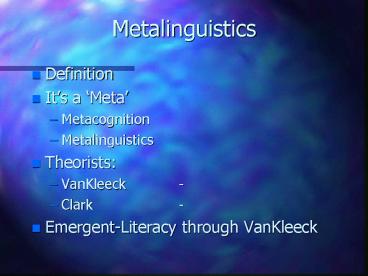Metalinguistics - PowerPoint PPT Presentation
1 / 16
Title:
Metalinguistics
Description:
Check the results of one's utterance. check whether the listener has understood: ... language ( hypothetical realms for metaphors, similes, parodies, analogies) ... – PowerPoint PPT presentation
Number of Views:1310
Avg rating:3.0/5.0
Title: Metalinguistics
1
Metalinguistics
- Definition
- Its a Meta
- Metacognition
- Metalinguistics
- Theorists
- VanKleeck -
- Clark -
- Emergent-Literacy through VanKleeck
2
Metalinguistics Importance 2
- Importance the pinnacle of language development
- ability to analyze language
- use higher forms
- oral language-literacy connection
3
Aspects of Metalinguistics 3
- 1. Taxonomies
- VanKleeck-more literacy focused
- Clark more language focused
- 2. Comprises
- 1. Meta-components
- meta p,p,s,s
- 2. Performatives
- humor
- figurative language
- idioms proverbs
- metaphors similes
- 3. Emergent Literacy
4
Clarks Taxonomy, 1.6-4yrs
- 1.6-2 years
- Monitors ones on-going utterances
- repair spontaneously
- practice sounds, words simple sentences
- adjust ones speech to different listeners
- 3-4 years
- Check the results of ones utterance
- check whether the listener has understood if not
repair - comment explicitly on own utterances and those of
others - correct others
5
Clarks taxonomy, 3-4 yrs. cont.
- 3-4 years, continued
- test for reality
- decide whether a word or sentence works in
furthering listener understanding - attempt to learn language deliberately
- practice new sounds,words, sentences
- practice speech styles of different roles
6
Clarks taxonomy, School-age
- School-age
- predict consequences of using particular forms
(inflections, words, phrases sentences) - apply appropriate inflections to new words
- judge utterances as appropriate for a speech
listener or setting - correct word order and wording in sentences
judged as wrong
7
Clarks Taxonomy, School Age finish
- reflect on the product of an utterance
- identify specific linguistic units
- explains why some sentences are possible and how
to interpret them - provide definitions of words, multiple meaning
words, synonyms, antonyms, homonyms - uses performatives
8
Metalinguistic Taxonomies
- Clarks taxonomy
- Van Kleecks (more emergent literacy focused)
- Four Stages
- Stage I (Age 1.6-2)
- distinguishes Print from non-print
- knows how to interact with books right side up,
turning from left to right - Recognizes some printed symbols brand names
(logographic)
9
VanKleecks Taxonomy VK2
- Phase II ( Ages 2-6)
- ascertains word boundaries in spoken sentences
- ascertains word boundaries in printed words
- engages in word substitution play
- plays with the sounds of the language
- begins to talk about language parts of about
talking ( speech acts) - corrects own speech/language to help the listener
understand the message (spontaneously or in
response to the listener request) - self-monitors own speech and makes changes to
more closely approximate the adult model
phonological first, lexical and semantic speech
style last - believes that a word is an integral part of the
object to which it refers (word realism) - inability to consider that one word could have
different meanings
10
Van Kleecks Taxonomy VK3
- Stage 3 (ages 6-10)
- Begins to take listener perspective and use
language form to match - Understands verbal humor involving linguistic
ambiguity riddles - Able to resolve ambiguity
- lexical first homophones
- deep structure (will you join me in a bowl of
soup - morphologic/phonologic (What do you have if you
put three ducks in a box? A box of quackers)
11
Van Kleeks Taxonomy VK4
- Able to understand word can have multiple
meanings - Able to resequence language elements
- (brown, the, fence fox, over, jumped, the)
- Able to segment syllables into phonemes
- Finds it difficult to appreciate Figurative Forms
other than Idioms - Stage IV (Ages 10
- Able to extend language meaning to figurative
language ( hypothetical realms for metaphors,
similes, parodies, analogies) - Able to manipulate various speech styles to fit a
variety of contexts and listeners
12
Metalinguisticss Skills
- Metalinguistic Components
- 1. Meta-components
- meta p,p,s,s
- Metapragmatics Why its important to say
Thank you - Metaphonology phonemic awareness
- Metasemantics explaining what a word means,
multiple meaning words, synonyms, antonyms,
homonyms, multiple meaning words - Metasyntax parts of speech, diagramming
13
Metalinguistics Components
- 2. Performatives
- humor
- visual
- verbal
- inferential (deep structure)
- ambiguity
- figurative language
- idioms Strike a bargain, hop a plane, break a
date - metaphors Your teeth are like stars, they come
out at night - proverbs A penny saved, is a penny earned
- analogies A father is a man, a mother is a .
- Similes
14
Metalinguistics Components
- -3. Emergent Literacy
- Text manipulation
- Discourse Competency
- Text Comprehension
- Phonologic Awareness
15
METALINGUISTICS Summary
- 1. Definition
- 2. Taxonomies
- VanKleeck
- Clark
- 3. Components
- 1. Meta-components pragmatics, phonology,
semantics, syntax - 2. Performatives
- humor multiple meaning words
- figurative language
- idioms similes
- proverbs metaphors
- 3. Emergent Literacy
16
END Metalinguistic NOTES































